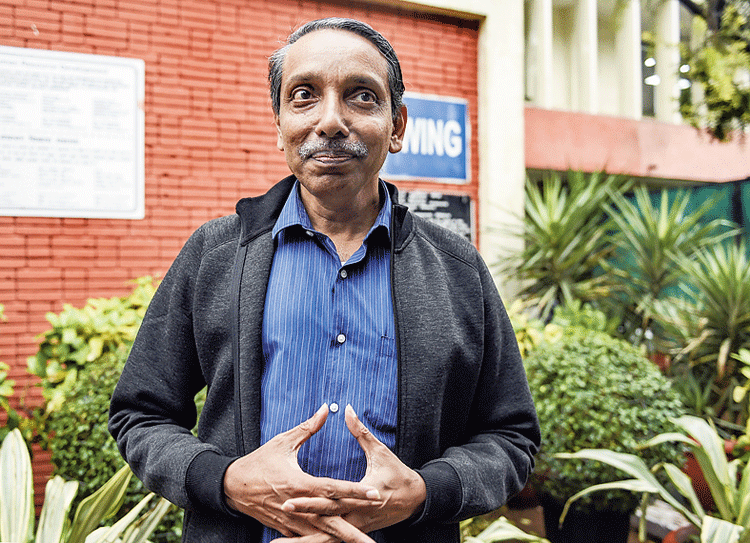Mamidala Jagadesh Kumar, vice-chancellor of JNU where hostel boarders are being asked to pay a hiked fee, has been occupying two official accommodations for the past four years.
Kumar was allotted a house on the JNU campus when he was appointed VC in January 2016, but continues to retain his quarters at IIT Delhi where he is a professor of electrical engineering with specialisation in nano-electronics.
Kumar is on lien from the tech school, where he is expected to return when his JNU tenure expires after one more year.
His retention of the IIT accommodation, however, is based on a now-revoked institute rule that allowed professors to hold on to their quarters for five years if they were appointed vice-chancellors of central universities or directors of other IITs.
IIT Delhi amended this policy in 2017 to reduce the duration of free house retention to one year, for professors appointed administrative heads at other centrally funded institutions.
But Kumar and some others who too are on lien or deputation elsewhere have been exempted from this policy on the ground that their retention of their quarters predated the new norm.
Several academics told The Telegraph that Kumar should not be holding on to his IIT Delhi quarters when most teachers at the institute lack campus accommodation.
This newspaper sent an email to Kumar and JNU spokesperson Poonam Kudesia, and made calls and sent text messages to Kumar’s mobile number, seeking comments. There was no response till Sunday evening.
IIT Delhi has quarters for a little over 300 of its about 500 teachers. To address the shortage, it has rented about 10 private residences in the Hauz Khas area, spending several lakh rupees a year. The rest of the teachers have to fend for themselves.
“It’s absolutely wrong that Professor Kumar has retained two houses when many IIT Delhi teachers have to stay outside,” said A.L. Agarwal, a retired IIT Delhi professor.
“He should have vacated the IIT house immediately after securing accommodation at JNU.”
Agarwal said one could perhaps understand if a professor held on to two houses after being appointed in a different city, “but the distance between IIT Delhi and JNU is not even 1km”.
A senior IIT Delhi official said that after the house-retention policy was changed in 2017, some of the professors on lien outside had argued against the new rule being applied to them. They said they would not have accepted the outside appointment had they known they would have to vacate the old quarters, where some of them had left their families back.
“So, in cases like Professor Kumar’s, we decided not to apply the policy retrospectively,” the official said.
Not everyone at the institute is happy with this logic, a senior IIT Delhi faculty member, who didn’t want to be quoted, told this newspaper.
Rajeev Kumar, a professor at JNU’s School of Computer and System Sciences who teaches academic ethics to research students, said the vice-chancellor should have given up his IIT quarters.
“It’s a matter of ethics. A vice-chancellor or a teacher is a role model for the students. A good administrator practices ethics first and then expects the same behaviour from others,” he said.
Kumar and the other IIT Delhi professors on lien outside who have retained their old quarters have to pay a nominal monthly rent of Rs 1,200. However, the market rate for these houses is about Rs 90,000 — which is what a teacher who resigns and joins a private college has to fork out while retaining his quarters for a short time till he finds new accommodation.
A human resource development ministry official said that a teacher’s lengthy retention of two houses is a loss for the exchequer.
IIT Delhi pays a house rent allowance to teachers whom it cannot provide with quarters. Its inability to allot Kumar’s old quarters to another teacher has inflated its house rent allowance bill.
Kumar’s retention of his IIT quarters for a nominal rent contrasts with the steep hostel fee hike his administration has imposed at JNU, belying its reputation for affirmative action in favour of students from disadvantaged families.
The students, agitating for two-and-a-half months against the hike that was only partially reduced last week, have been saying that the government appeared ready for a climb-down but Kumar was holding out.
One IIT Delhi official sought to justify Kumar’s retention of his old quarters saying he was continuing his association with the tech school.
“Professor Kumar quite often holds early morning classes at the institute. He has many research projects and guides many research scholars here,” he said.
On the other hand, a JNU official said, Kumar has never taught a single class at the university, where he has the option of engaging himself with three different centres.
“According to his specialisation, he can teach at the Special Centre for Nano Science, or the School of Engineering, or the School of Computer and System Sciences. But he never held a single class in the last four years,” he said.
A University Grants Commission official said that vice-chancellors usually did some teaching but there was no compulsion on them.
“The expectation from vice-chancellors is to run their universities smoothly. If they hold classes, it’s good — many vice-chancellors do,” he said.











